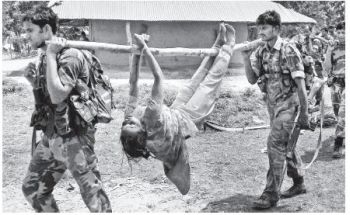Death And The Maiden
By S V Rajadurai and V Geetha
17 June, 2010
Countercurrents.org
A photograph featured in The Hindu, dated 17-06-2010 shows security personnel in West Bengal , carrying the body of a woman killed in a purported raid on a Maoist hideout.

The woman's body had been trussed up like the carcass of a dead animal. The photo speaks volumes of how the Indian state views those it considers a threat to the internal security of the nation - as people beneath its contempt and consideration. The photo featured alongside that of the dead woman shows a 'captured' young adivasi man, barely past his adolescence - a face that could stand in for a large number of disenfranchised, poor and desperate tribals, who are being treated as enemies of the state for merely wanting to lead a life of autonomy and dignity. Merely labeling the dead woman and this young man 'Maoist' does not explain the reasons for their disenchantment with the Indian state's policies, both at the regional and national levels - policies which are calculated to deprive them of their right to life and livelihood. Nor does such a labeling take away from the cynical and outrageous disregard and disrespect that these photos represent.
There is a civic decorum that democratic life demands we share, and the media is as much a party to this compact. But when the media presents such photos without comment, and agrees to treat a section of the Indian citizenry as little more than animals to be hunted, one wonders what the democratic contract is all about - perhaps it is a lovely fiction that we all like to invoke when struggles for equality and justice turn violent; and which we allow ourselves to forget when we feel triumphant over our political opponents or when we wish to endorse those who are clearly enemies of the people, as in the Bhopal case.
S. V. Rajadurai is a writer, translator and civil rights activist. He has written widely in Tamil and English on a range of subjects including socialism, anti-caste radicalism, literature and society, art and revolution. A long time member of the People’s Union of Civil Liberties, he has been active in the campaign against the death penalty. Formerly a professor with the Centre for Periyar Studies, Bharathidasan University, Trichy, he continues to write and participate in civil rights work.
V. Geetha is a writer and editor, currently with Tara Books, Chennai. She has been active in the women’s movement for over two decades, and has written in Tamil and English on gender, caste, anti-caste radicalism and socialism.
Rajadurai and Geetha have jointly authored Towards a Non-Brahmin Millennium: from Iyothee Thass to Periyar, Samya, Kolkatha, (1998); 2006

